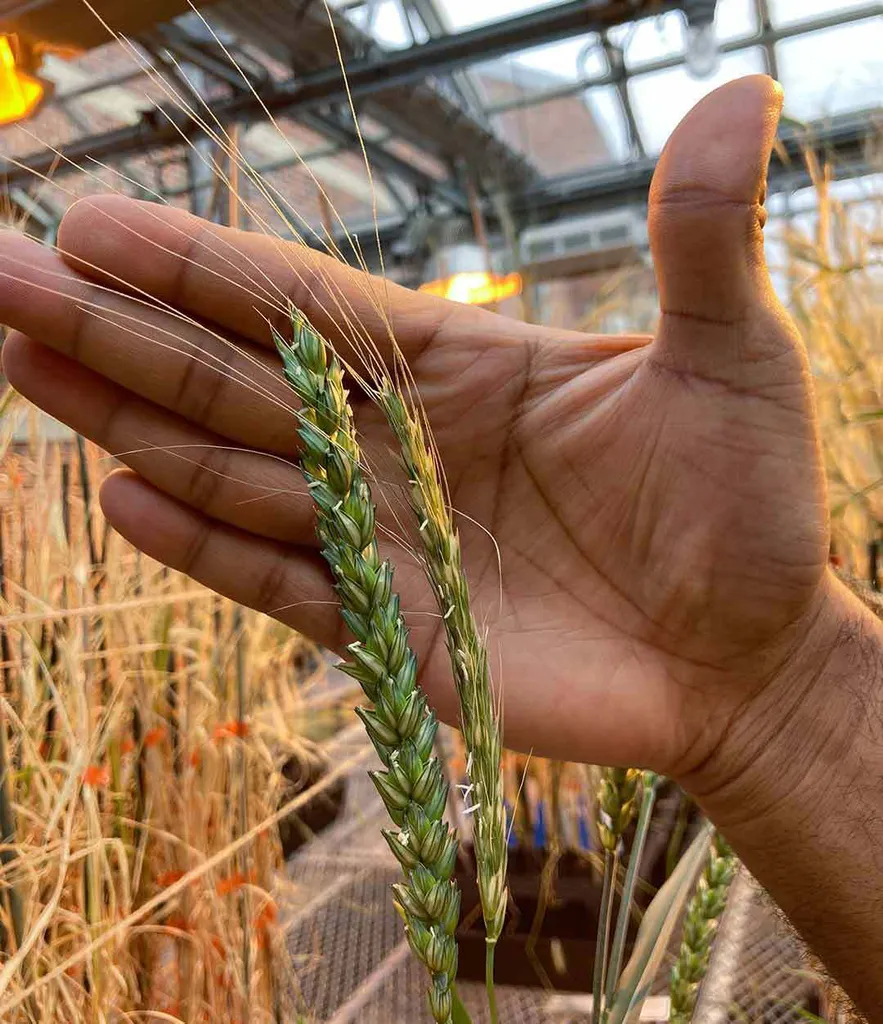- February 11, 2022
- By Kimbra Cutlip
A University of Maryland-led international team of researchers is working to identify genes for pathogen and pest resistance in an ancient species of wild wheat, with the goal of breeding tolerance traits into domestic varieties of the vital staple crop.
The effort, supported by a new $799,775 grant from the U.S. Department of Agriculture’s National Institute of Food and Agriculture (NIFA) could help safeguard a crop that provides 20% of all calories consumed globally.
The three-year plant breeding partnership is led Vijay Tiwari, assistant professor in the Department of Plant Science and Landscape Architecture, whose work was instrumental in sequencing the wheat genome in 2018.
“Our goal is that by the end of this three-year cycle, we will have identified some very unique genes that provide resistance against a list of nearly a dozen pathogens that affect wheat crops around the world,” he said. “And we hope to have cross-bred these traits from einkorn”—a distant ancestor of domesticated wheat—”into bread wheat.”
Considered a foundation of human civilization, the wheat we eat today has been cultivated over thousands of years to produce desirable traits such as large grains and high yields. But modern wheat lacks the genetic diversity that is essential for adaptation to emerging threats such as a changing environment, pests and diseases. As the global population continues to expand, modern wheat producers will need more resilient forms of wheat to continue feeding the world.

Tiwari and his team have selected a panel of 282 genetically diverse lines of einkorn wheat carrying a broad spectrum of genes that may be available in the domestic wheat genome, but have been turned down or off—or completely bred out—in modern wheat varieties.
Working in six countries on four continents, Tiwari and his collaborators will conduct experiments to identify genes that confer resistance to wheat pathogens and pests. The research teams will then selectively breed domestic wheat to incorporate those genes. They will also experiment with cross-breeding domestic wheat with einkorn wheat types to improve its resilience.
“In other types of studies, scientists can insert genes from other plants that they know will provide the desired outcome, but genetically modified wheat, or GMO, wheat is not acceptable in most of the wheat-growing countries,” Tiwari said. “So, we need to find other ways to rapidly improve wheat to help feed the nearly nine billion people in the world. With this project, we can do this with simple breeding.”
A geographically dispersed team of researchers can look for genes that provide resistance to pathogens that are endemic to their regions without concern for introducing new diseases elsewhere.
In Maryland, where a fungal disease called fusarium head blight (scab) is a concern for wheat growers, Assistant Professor and co-principal investigator Nidhi Rawat will look for genes in einkorn wheat that increase resistance to scab. Meanwhile, a team in Bolivia is looking for resistance to wheat blast, which is prevalent in that country but has just recently appeared in Bangladesh, where there is no resistance to the disease.
The team also plans to sequence the full einkorn genome for future reference. The grant builds on a previous NIFA-funded project of Tiwari’s to develop a method for quickly and efficiently integrating new genes and traits into wheat through breeding while avoiding many unwanted traits that a wild variety such as einkorn would possess.
